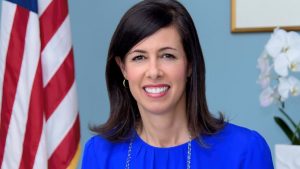
After more than 40 years of operation, DTVE is closing its doors and our website will no longer be updated daily. Thank you for all of your support.
FCC’s Rosenworcel calls for blackout refunds, battle over net neutrality looms
FCC chair Jessica Rosenworcel has called for US cable and pay TV consumers to be given a refund in the event that programming is ‘blacked out’ because of disputes between operators and content companies.

FCC chair Jessica Rosenworcel
The FCC chair has shared two Notices of Proposed Rulemaking with her fellow Commissioners that would, if adopted by a vote of the full Commission, seek comment on rebates for consumers and requiring notifications to the Commission of blackouts lasting more than 24 hours.
The first proposal that seeks comment on whether and how to require cable and satellite providers to issue rebates to subscribers in the event of a blackout due to a failure to reach a retransmission consent agreement with broadcast station or broadcast group’s owners.
The second seeks comment on a proposal to require Multichannel Video Program Distributors (MVPDs) to notify the Commission via an online public portal when there is a blackout of 24 hours or more of broadcast programming due to a failure to reach a retransmission consent agreement.
“Enough with the blackouts. When consumers with traditional cable and satellite service turn on the screen, they should get what they pay for. It’s not right when big companies battle it out and leave viewers without the ability to watch the local news, their favorite show, or the big game. If the screen stays dark, they deserve a refund,” said Rosenworcel.
Battle over net neutrality
The FCC has separately issued a ‘fact sheet’ on net neutrality after Rosenworcel recently called for a reinstatement of net neutrality rules including the classification of broadband services as a telecommunications service under Title II of the Communications Act. This classification was adopted by previous Democratic administrations but reversed by Republican-appointed FCC chair Ajit Pai in 2017. Broadband is currently regulated as a ‘information service’ under Title I of the act, which subjects the industry to less stringent regulation.
The Rosenworcel-led FCC argues that classifying services under Title II would restore basic rules to prevent broadband providers from blocking legal content, throttling speeds, and creating paid-for fast lanes; protect freedom of speech; ensure fair treatment of consumers; restore broadband consumer privacy and data security protections that apply to all telecommunications services; help fight scam calls and texts that often originate from online platforms and establish a uniform national standard for internet openness rather than a patchwork of state-by-state approaches.
The net neutrality proposal is expected to adopted by the FCC at its meeting on October 19, potentially triggering a legal battle with broadband service providers opposed to the regulation.
While the broadband providers were in the past unsuccessful in challenging classification under Title II, there is some speculation that the current Supreme Court may this time decide otherwise.
Two legal commentators, writing in a white paper funded by industry bodies USTelecom and the NCTA recently argued that the Supreme Court would likely scotch the FCC’s bid to re-impose net neutrality because it takes a more critical approach on whether Federal agencies can decide on ‘major questions’ without instructions from Congress.


